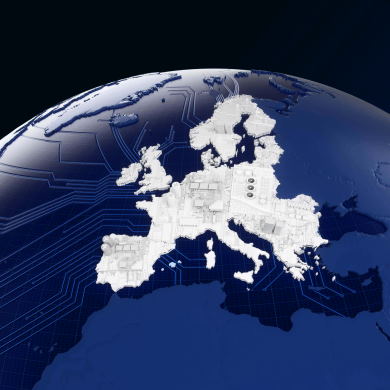In recent years, the public sector in Europe has seen remarkable advancements driven by technology. Digital governance solutions are providing essential services to citizens and businesses alike in a more efficient, personalized way than ever before. We can see this at every level of government and across multiple continents – from digitalized tax systems in Belgium to e-services for tourists in Greece or intelligent transport systems spanning entire regions of Spain – technological transformation is rapidly changing how governments serve their people. In this blog post, we’ll take an overview of the evolution of digital governance across Europe and the innovative solutions currently being implemented to power modern government services.
Potential of digital governance in Europe: benefits to businesses and citizens
Digital governance is becoming an increasingly popular method of governing in Europe. By using digital technologies, governments can increase efficiency and transparency while reducing costs. Furthermore, digital governance allows for decision-making processes to be more streamlined and allows citizens to access information on a range of services quickly and easily. That said, there are still many benefits that businesses and citizens can enjoy by implementing digital governance initiatives in Europe.
For businesses, digital governance brings several advantages, including the ability to engage with government officials much more efficiently than before. This could mean faster approval times for projects or applications and quicker responses from government departments when queries arise. Additionally, by streamlining bureaucratic processes, digital governance can reduce overhead costs for businesses and help them become more competitive in the global market.

For citizens, digital governance can bring a range of benefits too. Firstly, it increases access to government services and information, meaning that citizens can better understand the issues they are facing and use this information to make more informed decisions. Secondly, digital governance enables citizens to engage with their governments effectively by allowing them to voice their opinions through online forums or surveys.
Ultimately, digital governance is extremely beneficial to businesses and citizens across Europe. Providing greater access to public services and allowing for streamlined decision-making processes helps promote fairer outcomes while reducing costs associated with bureaucratic processes. It is clear that digital governance has much potential to benefit businesses and citizens in Europe.
The power of decentralized governance – blockchain-based solutions in Europe
The growth and development of blockchain technology have enabled Europe to take advantage of the many opportunities presented by decentralized governance. Blockchain-based solutions present a unique opportunity for European countries to create transparent, secure, and efficient governance systems. By using distributed ledger technology (DLT), governments can securely store and track data related to public sector activities, creating an immutable record that is difficult to tamper with or forge.
Governments can also benefit from blockchain-based identity management systems, allowing citizens’ personal information to be validated quickly and securely to prevent fraud and improve accuracy in government services. Furthermore, smart contracts can enable governments to automate complex processes such as contract negotiations, ensuring compliance with laws and regulations more effectively than ever before.
 In addition, using cryptographic tokens in blockchain-based systems can enable governments to reduce their administrative costs and speed up decision-making processes. By using digital tokens as currency, governments can create more efficient financial systems and ensure that they can track and monitor all transactions accurately. This will also make it easier for citizens to pay taxes or receive public services, as they can do so rapidly through a single platform.
In addition, using cryptographic tokens in blockchain-based systems can enable governments to reduce their administrative costs and speed up decision-making processes. By using digital tokens as currency, governments can create more efficient financial systems and ensure that they can track and monitor all transactions accurately. This will also make it easier for citizens to pay taxes or receive public services, as they can do so rapidly through a single platform.
Finally, blockchain technology allows European countries to take advantage of the many benefits of decentralized governance. DLT creates a system in which decisions regarding government activities are made by consensus instead of relying on centralized control mechanisms. This ensures that citizens have direct input into how their governments operate and enables them to hold their elected officials accountable for their decisions.
In conclusion, blockchain-based solutions present a powerful opportunity for European countries to improve the efficiency and transparency of their governance systems. By using DLT, governments can create secure and immutable records of public sector activities while providing citizens with more direct control over their governments’ operations. Ultimately, this will enable Europe to take full advantage of the many benefits of decentralized governance and create a more transparent and efficient system of government.
![The [204] Design Collective](https://www.the204designcollective.com/wp-content/uploads/PIC-LOGO_2.png)



